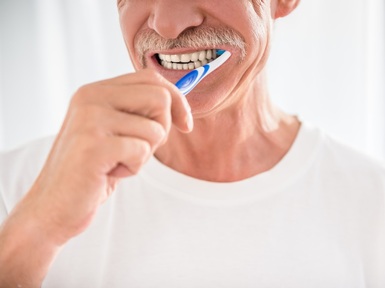Older people encouraged to incorporate sugar-free gum into dental hygiene routines
According to new research, three out of four people do not use sugar-free gum as part of their dental health regime and are becoming increasingly unaware of its oral health benefits.

Europe’s largest dental treatment provider, mydentist, is raising awareness of why older people should incorporate sugar-free chewing gum into their dental hygiene plans.
Barry Cockcroft, non-executive director at mydentist and former chief dental officer for England, believes that chewing sugar-free gum should be a staple part of oral hygiene routines. He said: “Our research has shown that older generations may have an aversion to chewing gum, with many perceiving it as rude, but in reality the benefits that can be gained from using sugar-free gum should not be missed for this reason.
“As we age, our glands tend to produce less saliva, which can result in an abundance of issues including dry mouth, increased risk of cavities and dental erosion. Chewing sugar-free gum helps to combat all of these and can lead to much better oral health.
“However, people of all ages should be aware that chewing sugar-free gum is not a replacement for other aspects of your dental care plan. It should form part of your existing routine of brushing twice a day with a toothbrush and fluoride toothpaste, and regular trips to your dentist to ensure that any underlying problems are treated by a professional.”
mydentist asked 750 UK residents whether they chewed sugar-free gum on a regular basis, as part of their oral healthcare routine.
Researchers found that 73 per cent of those surveyed do not use sugar-free chewing gum as part of their oral health plan, while 47 per cent of 55 to 64-year-olds believed chewing gum was rude.
Using sugar-free gum on a regular basis can provide a range of oral health benefits for older people, including; maintaining healthy teeth and gums and the prevention of dental erosion, cavities and dry mouth.
Saliva is the mouth’s natural defence mechanism against acid. During an acid attack, the enamel of the teeth begins to erode and the minerals start to deteriorate, leaving an individual more susceptible to cavities. Chewing sugar-free gum helps to replace these minerals.
Similarly, after individuals eat and drink, the mouth can be deprived of saliva for some time, and it can take up to an hour for the minerals to replace naturally. However, chewing sugar-free gum after eating has been found to increase the flow of saliva to help renew lost minerals more quickly.
Mr Cockcroft added: “While it won’t reverse long-term damage to your teeth, we do know that chewing sugar-free gum can benefit your teeth and gums. The increased saliva flow is enormously advantageous, helping with everything from reducing the risk of cavities to gum disease.
“However, chewing sugar-free gum should not be used as a replacement to other aspects of dental care such as brushing at least twice a day with a good quality toothbrush and fluoride toothpaste. Nor should it replace your regular trips to the dentist to ensure that any potential issues are dealt with before they become serious.”
For more information on mydentist visit: https://www.mydentist.co.uk/dental-health
Latest News
 29-Jul-24
Dementia Bus gives carehome.co.uk staff insight into life with dementia
29-Jul-24
Dementia Bus gives carehome.co.uk staff insight into life with dementia
 01-Mar-24
Find out the top care homes in 2024
01-Mar-24
Find out the top care homes in 2024
 21-Mar-23
UK's top care homes in 2023 revealed
21-Mar-23
UK's top care homes in 2023 revealed
 03-Jan-23
carehome.co.uk launches free care helpline
03-Jan-23
carehome.co.uk launches free care helpline
 13-Dec-22
5 mins with Emily Whitehurst, chief operating officer for Constantia Healthcare
13-Dec-22
5 mins with Emily Whitehurst, chief operating officer for Constantia Healthcare